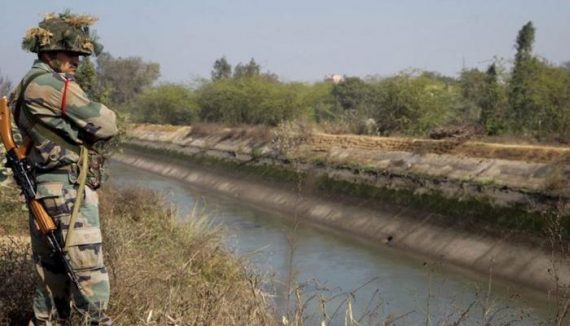Chandigarh: Haryana health minister Anil Vij has said that the help of Indian Army should be taken to ensure construction of controversial Satluj Yamuna Link canal. He also criticised Punjab state’s politicians for opposing the Supreme Court of India’s November 10 verdict annulling Punjab Termination of Agreements Act, 2004 and thereby paving way for the construction of controversial canal.
Anil Vij [ File Photo]
Haryana’s minister, who is known for making controversial remarks, said that Punjab CM Parkash Singh Badal or Congress party’s Punjab chief do not own Punjab nor the canal pass through their courtyard. He favoured use of the Indian Army to ensure the construction of the SYL canal.
Anil Vij’s statement came a day after the Khaps of Haryana threatened to block Punjab’s road and railways access to the Delhi.
MUST WATCH VIDEO – EXCLUSIVE: SC Verdict on SYL Canal Shows that India Treats Punjab as Occupied Territory
Loot of Punjab Waters – the (so-called) Agreements:
The Central Governments of India made ‘extra-legal and extra-constitutional arrangements’ (as these arrangements were made in violation of relevant provisions of the Indian Constitution) to allocate Punjab’s river waters to the afore-mentioned non-riparian states. These arrangements include the so-called agreements of 1955, 1976 (notification), 1981 (Indira Award) and 1986 (Eradi Tribunal). The Indian state used Section 14 of Interstate River Water Dispute Act, 1956 which was not applicable on Punjab rivers as Satluj, Beas or Ravi does not pass through Haryana, Rajasthan or Delhi. Similarly, section 78, 79 and 80 of Punjab Reorganisation Act, 1966 – under which Bhakhra Beas Management Board was constituted and other arrangements to loot the river water of Punjab were made – violate the Constitutional scheme by allowing the Centre’s interference in State’s exclusive subjects.
Punjab Termination of Agreements Act, Section 5 of PTAA and Punjab’s riparian rights:
The Punjab Termination of Agreements Act (PTAA) 2004 could be termed as a “murder” of Punjab’s riparian rights by none else than the Punjab’s own state assembly and elected representatives.
On 12 July, 2004 the Punjab Assembly passed PTAA in attempt to neutralise the Indian Supreme Court’s directions to complete the construction of controversial Satluj Yamuna Link (SYL) canal before 14 July, 2004. The law was moved by a Congress Government led by Captain Amarinder Singh and it was supported by the opposition Shiromani Akali Dal (Badal) and the Bhartiya Janta Party (BJP), thus this, the PTAA was passed unanimously by the state assembly.
Though the enactment of the PTAA had paused the issue of construction of the SYL for the time being, this law has done a larger damage. Before the enactment of the PTAA the river waters of Punjab were being robbed through illegal arrangements but since the adoption of Section 5 of the PTAA, illegal allocation of Punjab’s river water to non-riparian states has received the stamp of the Punjab Assembly.
It may appear strange, but it’s true, that in order to prevent construction of the SYL (that is supposed to carry out 34 LAF river water), the Punjab Assembly accepted and legalised the distribution of a major share of Punjab’s river water (around 147.5 LAF) to the non-riparian states of Rajasthan (86 LAF), Haryana (59.5 LAF) and Delhi (2 LAF).
It should also be noted here that according to Punjab’s ex-chief engineer G. S. Dhillon, Haryana is already getting 18 LAF (out of 34 LAF) by additional discharge from the Bhakhra Bias Management Board (BBMB) through the Bhakhra Canal. Mr. Dhillon maintains that the Hansi Butana Link canal project of Haryana aims at taking away the remaining 16 LAF (SYL) water (though extra discharge in Bhakhra Main Line to which Hansi Buntana will link at Samana area of Punjab) even without actual construction of the SYL canal.
The PTAA was declared ultra vires of the Constitution by the Supreme court of India on November 10, 2016.

